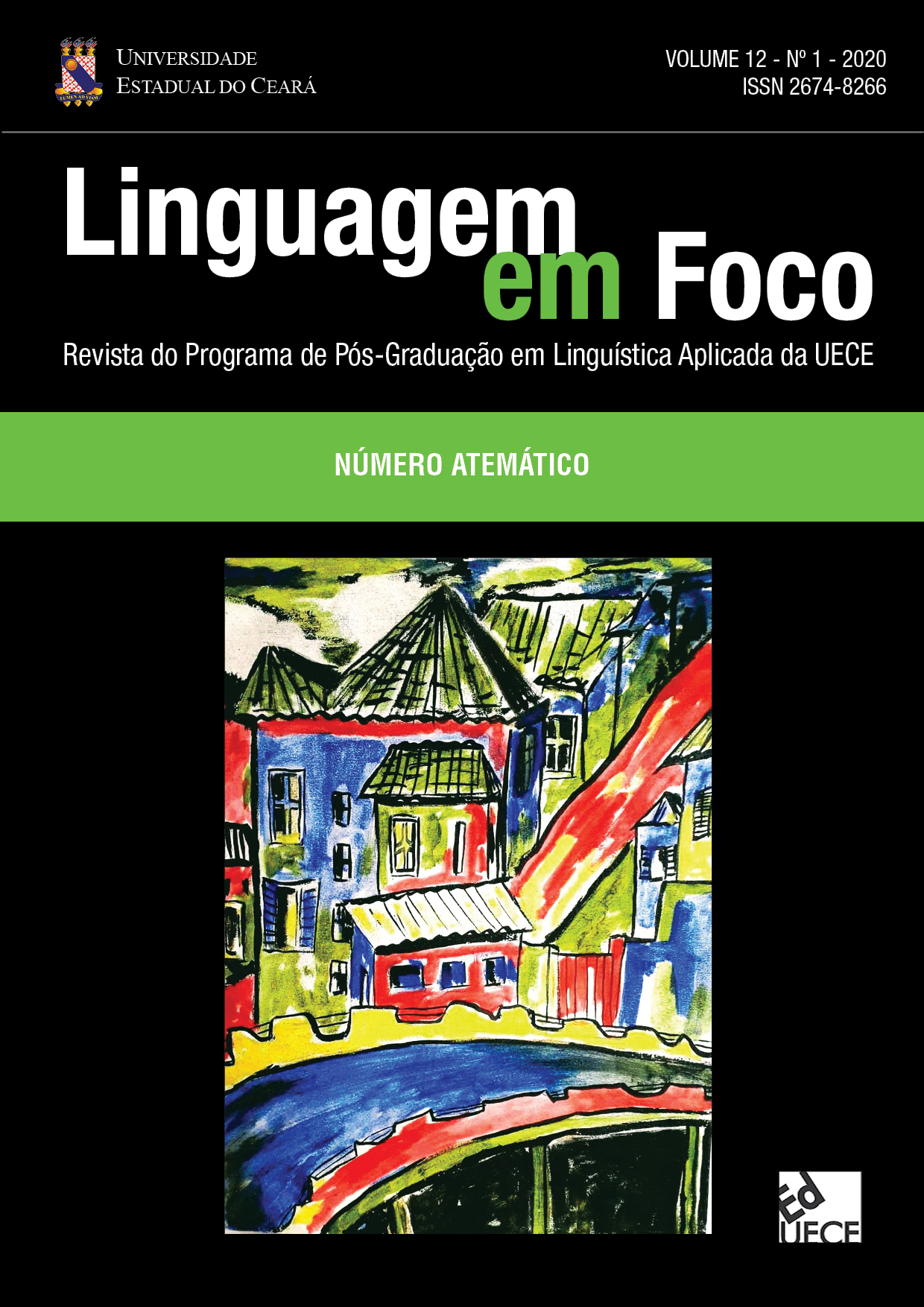Epistemological Approaches To (New) Literacies
DOI:
https://doi.org/10.46230/2674-8266-12-3113Keywords:
Literacies, New Literacies, Digital Technologies, Bibliographic ReviewAbstract
The literacy term has been the subject of study since the 1980s in Brazil. Kato (1986) introduced the term in her book In the world of writing: a psycholinguistic perspective. From then on, other studies were developed with the purpose of broadening the theme. In this sense, the aim of this article is to present the historical course on literacy in Brazil (TFOUNI, 1986; SOARES, 1998/2001; KLEIMAN, 2005; ROJO, 2009; among others), based on a bibliographic review. Besides, other researches were also developed to solidify the term (STREET, 1984, 1993, 1995/2014; BARTON; HAMILTON, 2000; KALANTZIS; COPE, 2012; among others). In addition, this article also features studies by Warschauer (2006) and Lemke (2010) that point out new literacies necessities with the changes brought by digital technologies. The researches mention to social practices of contextualized literacies and the need for new literacies with the integration of digital technologies.
Downloads
References
BAGNO, M.; STUBBS, M.; GAGNÉ, G. Língua materna: letramento, variação e ensino. São Paulo: Parábola, 2002.
BAGNO, M. Introdução. In: STREET, B. V. Letramentos sociais: abordagens críticas do letramento no desenvolvimento, na etnografia e na educação (Tradução Marcos Bagno). São Paulo: Parábola, 2014.
BARTON, D.; LEE, C. Linguagem online: textos e práticas digitais (Tradução Milton Camargo Mota). São Paulo: Parábola, 2015.
BARTON, D.; HAMILTON, M. Literacy practices. In: BARTON, D.; HAMILTON, M.; IVANIC, R. Situated literacies. London; New York: Routledge, 2000. p. 7-15.
BRASIL. Ministério da Educação. Base Nacional Comum Curricular. Brasília: MEC/CNE, 2017.
COMITÊ GESTOR DA INTERNET NO BRASIL. Educação e tecnologias no Brasil: um estudo de caso longitudinal sobre o uso das tecnologias de informação e comunicação em 12 escolas públicas. São Paulo: CGI.br, 2016.
FREIRE, P.; MACEDO, D. Alfabetização: leitura do mundo, leitura da palavra. 7o ed. São Paulo: Paz & Terra, 1997/2015.
KALANTZIS, M.; COPE, B. Literacies. Cambridge: Cambridge University Press, 2012.
KATO, M. A. No mundo da escrita: uma perspectiva psicolinguística. 4a ed. São Paulo: Ática: 1993.
KLEIMAN, A. B. Modelos de letramento e as práticas de alfabetização na escola. In: KLEIMAN, A. B. (org.). Os significados do letramento: uma nova perspectiva sobre a prática social da escrita. Campinas: Mercado de Letras, 1995.
______. Preciso “ensinar” o letramento? Não basta ensinar a ler e a escrever? (Coleção Linguagem e Letramento em foco). Brasília: Ministério da Educação, 2005.
LEMKE, J. L. Letramento metamidiático: transformando significados e mídias. Trabalhos Linguística Aplicada. v. 49, n. 2, p. 455-479, 2010.
MAIA, I. F.; VALENTE, J. A. Os letramentos na cultura da convergência. E-curriculum, São Paulo, v.7, n. 1, 2011, p. 1-23.
MORAIS, J. Alfabetizar para a democracia. Porto Alegre: Penso, 2014.
KNOBEL, M.; LANKSHEAR, C. A. A new literacies sampler. New York: Peter Lang Publishing Inc., 2007.
PEREIRA, J. T. Educação e sociedade da informação. In: COSCARELLI, C. V.; RIBEIRO, A. E. (orgs.). Letramento digital: aspectos sociais e possibilidades pedagógicas. Belo Horizonte: Ceale, Autêntica, 2005.
PINHEIRO, R. C. Conceitos e modelos de letramento digital: o que escolas de ensino fundamental adotam? Linguagem em (Dis)curso. Tubarão, SC, v. 18, p. 603-622, set./dez. 2018.
ROJO, R. (org.). Alfabetização e Letramento. 4o reimpressão. Campinas: Mercado de Letras, 1998.
______. Letramentos múltiplos, escola e inclusão social. São Paulo: Parábola, 2009.
SOARES, M. Letramento: um tema em três gêneros. 2o ed. Belo Horizonte: Autêntica: 1998/ 2001.
______. Alfabetização e letramento. 7o ed. (revista e ampliada). São Paulo: Contexto, 2017.
STREET, B. V. Literacy in theory and practice. Cambridge: Cambridge University Press, 1984.
______. Cross-cultural approaches to literacy. Cambridge: Cambridge University Press, 1993.
______. Letramentos sociais: abordagens críticas do letramento no desenvolvimento, na etnografia e na educação (Tradução Marcos Bagno). São Paulo: Parábola, 2014.
TFOUNI, L. V. Adultos não-alfabetizados: o avesso do avesso. 1986. 239 p. Tese (Doutorado em Ciências) – Curso de Pós-Graduação em Linguística, Universidade Estadual de Campinas, Campinas, 1986.
______. Letramento e Alfabetização. 9o ed. São Paulo: Cortez, 2010.
UNESCO. Education for all 2000-2015: achievements and challenges. 2015.
WARSCHAUER, M. Tecnologia e inclusão social: a exclusão digital em debate. São Paulo: Editora Senac, 2006.
Downloads
Published
How to Cite
Issue
Section
License
Copyright (c) 2020 Marcus de Souza Araújo

This work is licensed under a Creative Commons Attribution 4.0 International License.
Authors who publish in Linguagem em Foco Scientific Journal agree to the following terms:
- Authors retain the copyright and grant the journal the right of first publication. The articles are simultaneously licensed under the Creative Commons Attribution License which allows sharing the work with an acknowledgement of its authorship and initial publication in this journal.
- The concepts issued in signed articles are the absolute and exclusive responsibility of their authors. Therefore, we request a Statement of Copyright, which must be submitted with the manuscript as a Supplementary Document.
- Authors are authorized to make the version of the text published in Linguagem em Foco Scientific Journal available in institutional repositories or other academic work distribution platforms (ex. ResearchGate, Academia.edu).





























